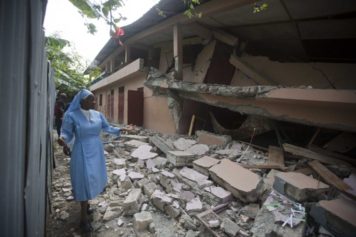Just over two years have passed since the cholera epidemic started its deadly march in Haiti, exacting a staggering toll. The most recent statistics from “Partners in Health” indicate that cholera has left 600,885 sick and taken 7,568 lives, with 76,981 new cases diagnosed in 2012.
As details emerged about the origin of the cholera epidemic, a disease not seen in Haiti in almost a century prior to the outbreak, it became clear that the UN stabilisation force, known by its French acronym, MINUSTAH, was to blame.
Yet, as we approach the one-year mark since human rights groups filed a claim against the UN for bringing cholera to Haiti, the UN has failed to respond to the charges levelled against it.
Advocates are seeking reparations for victims, as well as investments in Haiti’s water, sanitary and health infrastructure – measures necessary to end the epidemic as the impoverished country lacks resources to undertake them without assistance.
Outbreak of cholera
The evidence of UN culpability is clear. Among the UN troops deployed to Haiti in the aftermath of the devastating earthquake in January 2010 was a contingent from Nepal that was housed in the Mirebalais MINUSTAH camp, near a tributary of the Artibonite River that served to propagate the infection.
At the time the Nepalese soldiers were being trained prior to deployment, Nepal was experiencing a well-known cholera outbreak. Although many Nepalese showed the classic symptoms of cholera, approximately half of those infected were asymptomatic.
Despite what was known about the disease process in Nepal, routine health screening for soldiers whose deployment was imminent included testing of stool only when clinically indicated by symptoms. The lax screening procedures were further evident when, after the initial health screening, soldiers were given 10-day passes to travel around Nepal prior to deployment, including travel to cholera-infected areas without a subsequent health re-check.
In November 2010, French epidemiologist Renaud Piarroux concluded that someone in the MINUSTAH camp was responsible for introducing the infection into Haiti. In response to blistering criticism for its role in the cholera outbreak, the United Nations convened an independent panel to investigate the source of the outbreak and issue a public report of its findings.
Read more: Al Jazeera


